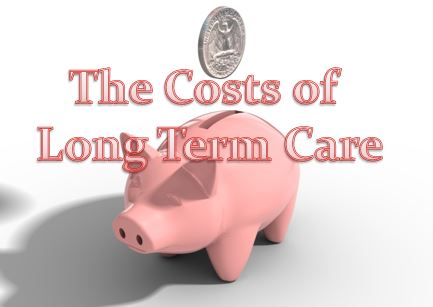Having an understanding of long term care costs is important for both the aging person who may need care now (or soon) and the Boomer adult who should be considering long-term care costs as part of retirement planning. Especially in light of the recent AARP study on the massive shortage of caregivers that will be available for the Boomer generation, we all need to be putting some consideration in to these issues.
Here are some quick statistics on nationwide average costs for long term care (from the 2012 MetLife market study of long term care):
- The national average daily rate for a private room in a nursing home was $248, while a semi-private room was $222 up from $239 and $214 respectively in 2011.
- The national average monthly base rate in an assisted living community rose from $3,477 in 2011 to $3,550 in 2012.
- The national average daily rate for adult day services remained unchanged from 2011 at $70 in 2012.
- The national average hourly rates for home health aides ($21) remained unchanged, while the homemaker hourly rate increased by 5.3% from $19 in 2011 to $20 in 2012.
- A private room in a nursing home in Florida averaged $259/day, while a semi-private room (far more common) averaged $230.
- The assisted living base rate averaged $3234/month.
- Adult day services averaged about $60/day throughout the state.
- Home care costs in Florida: the rate for a home health aide averaged $18/hour and for a homemaker companion slightly less at $17 (a homemaker companion provides non-hands on help only, such as light housekeeping, meal preparation, transportation and companionship).
- Assisted living rates are given as base rates. ALF contracts and billing vary widely, with some using a “level of care” model in which they determine the additional cost based on an assessment that places you within a certain level based on your needs or a la carte pricing for specific care services. Some use a more all-inclusive pricing model or may even use a combination of approaches.
- Often care is closely tied in to other living expenses and comparing costs requires looking at a more comprehensive budget. For example, a person receiving care at home has normal housing and living expenses such as utilities, groceries, mortgage/rent and maintenance. In a nursing home, residents will generally not incur any of those costs unless they continue to maintain their original home. In an assisted living facility, a number of those items are rolled in to the rate, though there may be additional costs (such as paying for phone or cable or buying personal groceries or restaurant meals).
- Related to the budgeting information above, long term care insurance will generally only pick up the costs of care. However, living expenses aren’t necessarily separated out in facility-based care (in other words, if you receive care at home, your LTC insurance will not cover utilities and home costs but a daily rate in a facility is more likely to include all of those costs).
- What other expenses should you consider in overall costs? Do not forget, for example: medical costs/insurance, medications, travel expenses, quality of life items (newspaper subscriptions, snacks, getting your hair done, personal training services, extra companion/help), transportation costs.
- Account for inflation. These are good estimates of today’s costs and you should expect prices to rise along with other living expenses.
A geriatric care manager can help you with understanding your potential long-term care costs, the options for eldercare and creating a projected budget. If you are a professional advisor, it may be worthwhile working in partnership with a care manager to help better prepare and advise your clients. A care manager can give you real insight about true costs so that you can really be as prepared as possible.

 Popular Downloads
Popular Downloads


 Get Our Newsletter!
Get Our Newsletter! Mission Statement
Mission Statement

